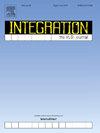Lightweight high-throughput true random number generator based on state switchable ring oscillator
IF 2.2
3区 工程技术
Q3 COMPUTER SCIENCE, HARDWARE & ARCHITECTURE
引用次数: 0
Abstract
True random number generators (TRNGs) perform an extremely critical role in cryptographic algorithms and security protocols, scientific simulation, industrial testing, privacy protection, and numerous other domains. Nevertheless, modern TRNGs have difficulty striking a reasonable balance between high throughput and low hardware consumption. In this paper, a novel lightweight high-throughput TRNG based on state switchable ring oscillators (SSROs) is proposed. Under the effect of flip-flops that are prone to entering the metastable region, the SSROs randomly switch between oscillatory and buffer states to create jitter and metastability. A feedback strategy is adopted to effectively eliminate the fixed point in the circuit, which further enhances the randomness of the structure. The proposed TRNG is implemented on Xilinx Artix-7 and Kintex-7 FPGAs, with support for automatic routing. It achieves a throughput of up to 400 Mbps while consuming only 16 LUTs and 13 DFFs, showing extremely high resource utilization efficiency. Experimental results show that the output random sequence passes the NIST SP800-22 test, the NIST SP800-90B test, and the AIS-31 test without any post-processing, exhibiting strong robustness against voltage and temperature variations as well as frequency injection attacks.
基于状态可切换环形振荡器的轻量级高吞吐量真随机数发生器
真随机数发生器(TRNG)在加密算法和安全协议、科学模拟、工业测试、隐私保护等众多领域发挥着极其重要的作用。然而,现代 TRNG 难以在高吞吐量和低硬件消耗之间取得合理平衡。本文提出了一种基于状态可切换环形振荡器(SSRO)的新型轻量级高吞吐量 TRNG。在容易进入可变区的触发器的作用下,SSRO 在振荡态和缓冲态之间随机切换,从而产生抖动和可变性。采用反馈策略可有效消除电路中的固定点,从而进一步增强结构的随机性。所提出的 TRNG 在 Xilinx Artix-7 和 Kintex-7 FPGA 上实现,并支持自动路由。它实现了高达 400 Mbps 的吞吐量,同时仅消耗 16 个 LUT 和 13 个 DFF,显示出极高的资源利用效率。实验结果表明,输出随机序列无需任何后处理即可通过 NIST SP800-22 测试、NIST SP800-90B 测试和 AIS-31 测试,对电压和温度变化以及频率注入攻击具有很强的鲁棒性。
本文章由计算机程序翻译,如有差异,请以英文原文为准。
求助全文
约1分钟内获得全文
求助全文
来源期刊

Integration-The Vlsi Journal
工程技术-工程:电子与电气
CiteScore
3.80
自引率
5.30%
发文量
107
审稿时长
6 months
期刊介绍:
Integration''s aim is to cover every aspect of the VLSI area, with an emphasis on cross-fertilization between various fields of science, and the design, verification, test and applications of integrated circuits and systems, as well as closely related topics in process and device technologies. Individual issues will feature peer-reviewed tutorials and articles as well as reviews of recent publications. The intended coverage of the journal can be assessed by examining the following (non-exclusive) list of topics:
Specification methods and languages; Analog/Digital Integrated Circuits and Systems; VLSI architectures; Algorithms, methods and tools for modeling, simulation, synthesis and verification of integrated circuits and systems of any complexity; Embedded systems; High-level synthesis for VLSI systems; Logic synthesis and finite automata; Testing, design-for-test and test generation algorithms; Physical design; Formal verification; Algorithms implemented in VLSI systems; Systems engineering; Heterogeneous systems.
 求助内容:
求助内容: 应助结果提醒方式:
应助结果提醒方式:


